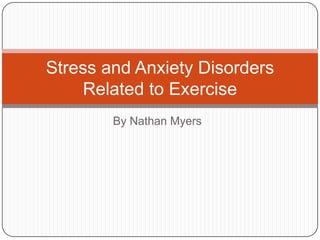
Stress and anxiety disorders related to exercise
- 1. By Nathan Myers Stress and Anxiety Disorders Related to Exercise
- 2. Overview Pathophysiology Hans Selye Definition of Stress: General Adaptation Syndrome (GAS) Alarm reaction Adaptation exhaustion
- 3. Relevance There are disagreements in the way “stress” is defined. Contemporary view However, there is no disagreement regarding the fact that stress affects our health. 40 million Americans suffer from some type of anxiety disorder (NIMH) approx. 18% of America (NIMH) (National Institute for Mental Health)
- 4. Relevance Because its prevalent in the human population, as a physical therapist, coach, or a personal trainer, we must have a clear understanding of how to approach this specific population. In addition, many of the subjects in this population seek exercise regimens in order to control their stress/anxiety levels. Therefore, this population will be seeking our help, and it’s our job to provide the correct information and programs.
- 5. Types of Anxiety Disorders Panic disorder Generalized anxiety disorder Social phobia Post-traumatic stress disorder Obsessive compulsive disorder Western View: Typically treated with medications Anxiolytic Drugs
- 6. Categories of Meds Azaspirones/Buspirone Benzodiazepines Beta Blockers Tricyclics (TCA) Monoamine oxidase inhibitors (MOI) Serotonin reuptake inhibitors
- 7. Signs/Symptoms of Anxiety Emotional Symptoms Feelings of dread Trouble concentrating Feeling tense and jumpy Anticipating the worst situation Irritability Restlessness Watching for signs of danger Feelings of a blank mind
- 8. Sign/Symptoms of Anxiety Physical symptoms Pounding heart Sweating Upset stomach or dizziness Frequent urination or diarrhea Shortness of breath Tremors and twitches Muscle tension Headaches Fatigue and Insomnia
- 9. Symptoms of Anxiety Attacks Surge of overwhelming panic Feeling of losing control Heart palpitations or chest pain Feeling of passing out Trouble breathing Hyperventilation Hot flashes or chills Trembling/Shaking Nausea or stomach cramps
- 10. Causes of Stress/Anxiety Disorders Primarily genetic Situational Depends on each individual and how they respond to a stimulus
- 11. Benefits from exercise Best results for reduction in anxiety involves more aerobic exercise than resistance training. Look for results after a few weeks of regular exercise Increases self esteem Releases endorphins Reduces immune system chemicals that may worsen anxiety Increases body temperature– provides a calming effect Distraction Gets mind off of everyday worries
- 12. Risks with Exercise in subjects who are taking Medications Overtraining- pushing the body beyond physical and psychological limitations Characterized by: Decrease in performance Fatigue Depression Heightened levels of anxiety Decreased libido Loss of appetite Crucial to have appropriate exercise mode and intensity
- 13. Considerations in Evaluating Subject Medications can reduce functional capacity, induce dizziness, inhibit motor function, or reduce the desire to perform at a high level of exertion. Important to evaluate neuromuscular function because meds could affect perception, alertness, and coordination.
- 14. Importance of Supervision Due to possibilities of med or condition related side effects Report any increased feelings of tiredness or exhaustion Shortness of breath or chest discomfort Heart palpitations Unusual mood swings Increased effort in everyday activities
- 15. Example of an Exercise Prescription
- 16. References ACSM’s Exercise Management for Persons with chronic disease and disabilities, 3rd edition. Chapter 50, stress and anxiety disorders.